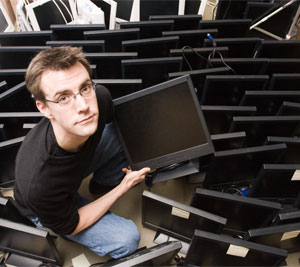 |
| Information Technology Services's Robin West poses with monitors that will be reused. (Court Milley Photo) |
║┌┴¤│ď╣¤═°has launched a new electronics recycling program, dubbed ÔÇťe-recycling.ÔÇŁ
Since October, ║┌┴¤│ď╣¤═°departments have been able to arrange for pick-up of electronic productsÔÇö such as old or broken desktop computers, monitors, laptops, printers and televisionsÔÇö that no longer have reuse potential. The service is offered free of charge and is activated by filling out an .
Once the material is collected, Information Technology Services (ITS) will take care of erasing the memory to ensure privacy. Then, the old and out-of-date materials will be transported to a depot where metals, glass and plastic are separated and recycled into new products.
The e-recycling program is Dalhousie's sixth recycling program. ║┌┴¤│ď╣¤═°also recycles fine paper, newsprint, corrugated cardboard, beverage containers and batteries.┬á
Rochelle Owen, DalhousieÔÇÖs Director of Sustainability, applauds the initiative.
ÔÇťTo move towards greater sustainability, the amount of waste we produce must be minimized. All processes in the life-cycle of a product need to be made as efficient as possible,ÔÇŁ she said.
DalÔÇÖs e-recycling program was given a big green thumbs up by The HourÔÇÖs George Strombolopoulos on a recent show. Mr. Strombolopoulos is spearheading CBCÔÇÖs One Million Acts of Green; the idea behind the campaign is that small acts add up and create a big difference. He congratulated ║┌┴¤│ď╣¤═°for removing obsolete technology from the waste stream.
One Million Acts of Green also singled out DalhousieÔÇÖs recent campus light bulb exchange. The student-led initiative oversaw the distribution of 1,000 energy efficient CFL light bulbs.
DalhousieÔÇÖs efforts to conserve energy expended by electronics have included replacing old computers in labs with new energy-saving computers. This new technology burns 40 per cent less energy than the previous computers, amounting to a savings of 400,000 kilowatt hoursÔÇö enough energy to run 44 average houses for a year.
Programs created by the Office of Sustainability have fostered interest and concern all over campus. In addition to the electronics recycling program, ║┌┴¤│ď╣¤═°is working to incorporate sustainability concepts and criteria into all major planning, assessment, policy, reporting and communications products and procedures.
ÔÇťOutstanding lectures, courses and programs explore a wide range of environment and sustainability-related issues that contribute to a new way of thinking,ÔÇŁ says Ms. Owen.
